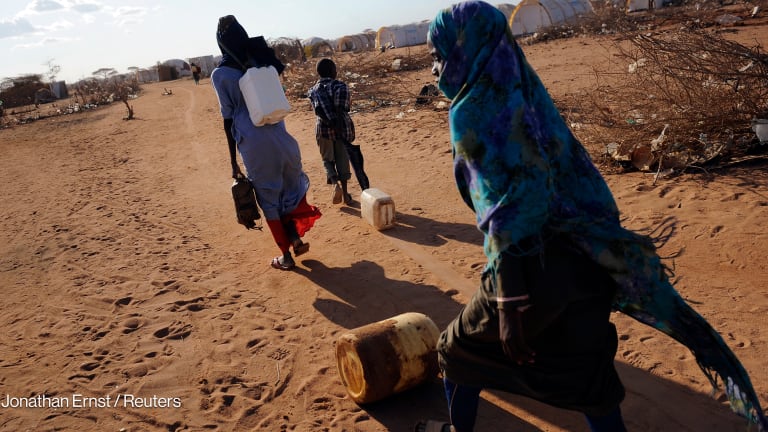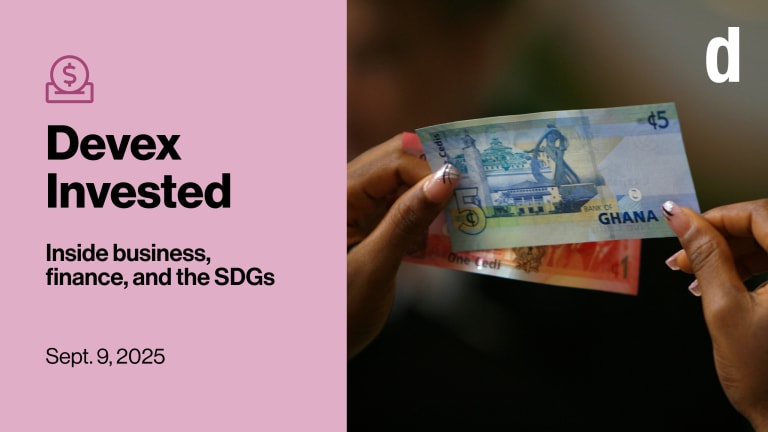
NAIROBI — Over the weekend, African politicians, members of the private sector, and civil society met in Kigali, Rwanda, for the annual Ibrahim Governance Weekend hosted by the Mo Ibrahim Foundation. This year’s conference focused on public service across the African continent.
The foundation released a report in the lead up to the conference, which noted that public services on the continent “remain a relatively small employer, at a cost higher than in other regions, with large country disparities.” Government expenditures, for example, ranged greatly among countries, from 35.8 percent in South Sudan to 4.4 percent in Chad. Sub-Saharan Africa, on average, spent only 2.3 percent of gross domestic product on public health. This is more than 10 times lower than the global average per capita health expenditure.
Devex spoke with Dr. Ibrahim Assane Mayaki, chief executive officer of the New Partnership for Africa's Development Planning and Coordinating Agency, or NEPAD Agency, about what is needed for African countries to improve their delivery of public services. The conversation has been edited for length and clarity.
For African countries that have low public spending, how has this impacted those countries?
Some countries, like Botswana, spend a lot in terms of education and health. Botswana has universal health coverage and primary and secondary education is free. But if you look at another country, like the Central African Republic, a lot of spending goes into issues of security and defense. There is not a significant amount spent in areas like education.
In terms of public expenditures, there are two issues. There is the level of expenditure and the quality of the expenditure. In Angola, for example, there is a high prevalence of malaria. Angola is spending a lot in fighting malaria, but malaria has not decreased significantly. Countries that have the best results in reducing malaria do this with quality expenditures. There was a big debate in South Africa, for example, in the past few years about HIV and tuberculosis. Through good cooperation with the [Joint United Nations Programme on HIV/AIDS] and the Global Fund, they improved the way they spent resources in fighting HIV and TB. They are now getting good results. They are targeting appropriate communities and making sure there is local access to antiretroviral treatment, and so on.
How can countries improve the provision of public services when they have massive public debt?
In the past seven to eight years, we have grown. African countries were among the countries in the world that grew at very high rates. Most of the countries that grew significantly did not have raw materials, such as Ethiopia, Rwanda, or Uganda.
Africa will not transform economically if we go below 7 or 8 percent growth. Infrastructure is critical for that. The demand for infrastructure led many African countries to increase their debt, through Eurobonds and other financial instruments. That debt today is becoming critical, if it was not invested in productive investment. If you indebt yourself just to spend on your operational costs, it is not the same as when you get into debt to invest in areas like agribusiness, development programs, or in IT infrastructure.
Today we have two types of countries: Those which have sound development strategies, with an intelligent debt that is linked to investment in productive sectors, and countries that have debt that is not linked to productive investment. Our recommendation, as the NEPAD Agency and the African Union, is to draw the attention of countries that are indebting themselves in order to spend in nonproductive sectors. We are advising them to look at their productive sectors, and allocate this public spending in an intelligent manner.
Could you talk about the links between public service and good governance?
The quality of public service is linked to institutional quality. Good governance systems have accountability, efficient use of resources, and they allow for citizens to draw attention to frustrations that they are having. When you have these elements in place, the quality of public services is always higher. It’s not a question of money.
“You need leaders who are accountable, who listen to their communities, who do not cling to power just for the sake of clinging to power and who have consultative processes in the design and implementation of public policies.”
— Dr. Ibrahim Assane Mayaki, chief executive officer of the NEPAD AgencyPoorer countries, with limited resources, can do the best they can in order to manage their resources effectively. Some rich countries, that have a lot of resources, don’t provide proper access to critical public services for their populations. It’s really an issue of leadership. You need leaders who are accountable, who listen to their communities, who do not cling to power just for the sake of clinging to power and who have consultative processes in the design and implementation of public policies. These leaders count on feedback from their populations on the quality of their public services. When this happens, public services improve.
What is NEPAD and the African Union doing to support governments to make those productive decisions and strategies?
African countries have had what might be called “external support” since independence. But an important conclusion that Africans have drawn is that you cannot develop if you just rely on [official development assistance]. You need ownership of your strategies. Ownership of your strategies means governments cannot have monopolistic behavior, they need to partner with civil society and the private sector.
For example, we know that governments do not create jobs, the private sector creates jobs. But governments need to create the conditions for the private sector to create jobs. There also needs to be better mobilization of domestic resources. As a region, we have poor taxation systems and mobilization of tax revenue. We need to increase that. We have quite high levels of illicit financial flows, because many companies in Africa don’t pay their taxes. This is because we don’t always have the capacity to make them pay their taxes. We lose a lot of money.
“Africa shouldn’t think about aid. Aid is not the solution. As a matter of fact, aid is a countersolution. It denies countries the ability to think in terms of ownership.”
—Africa’s problems are not due to a lack of financial resources, they are linked to a lack of instruments that can allow it to mobilize sufficient resources for its development. As NEPAD and the African Union, our role is to advise governments to stop illicit financial flows, mobilize domestic resources in a more efficient manner, create constructive partnerships with the private sector and civil societies, and attract foreign direct investment, but only through the basis of a development program.
Countries need bankable projects within their development plan. We need to increase the capacity of project preparation, so that projects are presented to institutional investors that are properly framed, with good returns on investment and that exist in a good business environment.
Africa shouldn’t think about aid. Aid is not the solution. As a matter of fact, aid is a countersolution. It denies countries the ability to think in terms of ownership.
Our role is also to tell countries to think regionally, not nationally. Thinking nationally will lead to suboptimal solutions. The more we think in terms of regional solutions, the more we create necessary economies of scale and create regional markets. With this, we can learn to become competitive.
Africa today looks like what Asia and China did in the 1950s. If you look at most of the experts who were analyzing India and China in the 1950s, they were not very optimistic regarding the future. China and India didn’t develop with aid. They developed with their ideas and with their leadership. It allowed them to leapfrog and make huge progresses. Africa today is psychologically in that same position. We are more confident than before. We don’t think solutions will come from outside. We believe more in ourselves. And we believe regional solutions are important. This is the most important asset that we have.








